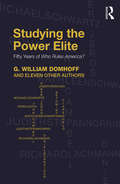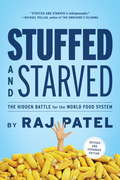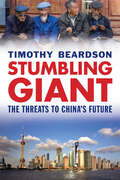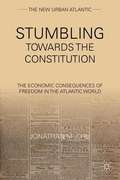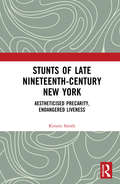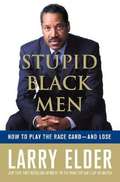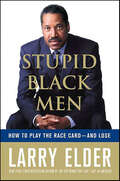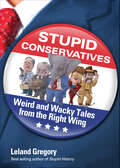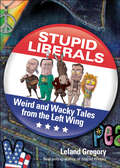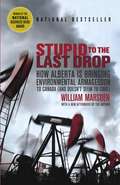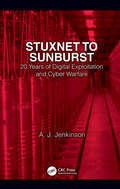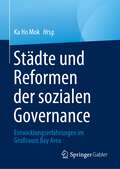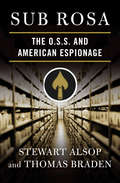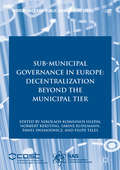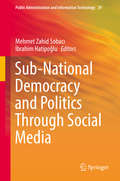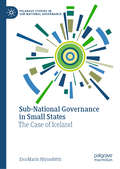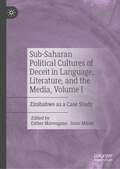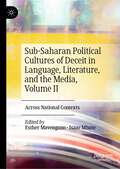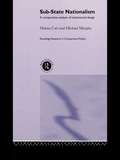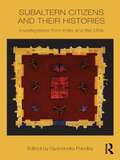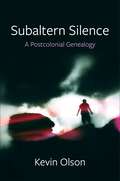- Table View
- List View
Studying the Power Elite: Fifty Years of Who Rules America?
by G. William Domhoff Eleven Other AuthorsThis book critiques and extends the analysis of power in the classic, Who Rules America?, on the fiftieth anniversary of its original publication in 1967—and through its subsequent editions. The chapters, written especially for this book by twelve sociologists and political scientists, provide fresh insights and new findings on many contemporary topics, among them the concerted attempt to privatize public schools; foreign policy and the growing role of the military-industrial component of the power elite; the successes and failures of union challenges to the power elite; the ongoing and increasingly global battles of a major sector of agribusiness; and the surprising details of how those who hold to the egalitarian values of social democracy were able to tip the scales in a bitter conflict within the power elite itself on a crucial banking reform in the aftermath of the Great Recession. These social scientists thereby point the way forward in the study of power, not just in the United States, but globally. A brief introductory chapter situates Who Rules America? within the context of the most visible theories of power over the past fifty years—pluralism, Marxism, Millsian elite theory, and historical institutionalism. Then, a chapter by G. William Domhoff, the author of Who Rules America?, takes us behind the scenes on how the original version was researched and written, tracing the evolution of the book in terms of new concepts and research discoveries by Domhoff himself, as well as many other power structure researchers, through the 2014 seventh edition. Readers will find differences of opinion and analysis from chapter to chapter. The authors were encouraged to express their views independently and frankly. They do so in an admirable and useful fashion that will stimulate everyone’s thinking on these difficult and complex issues, setting the agenda for future studies of power.
Stuffed and Starved
by Raj PatelCompletely updated and revised edition of one of the most widely-praised food books of recent years. It's a perverse fact of modern life: There are more starving people in the world than ever before, while there are also more people who are overweight. To find out how we got to this point and what we can do about it, Raj Patel launched a comprehensive investigation into the global food network. It took him from the colossal supermarkets of California to India's wrecked paddy-fields and Africa's bankrupt coffee farms, while along the way he ate genetically engineered soy beans and dodged flying objects in the protestor-packed streets of South Korea. What he found was shocking, from the false choices given us by supermarkets to a global epidemic of farmer suicides, and real reasons for famine in Asia and Africa. Yet he also found great cause for hope--in international resistance movements working to create a more democratic, sustainable and joyful food system. Going beyond ethical consumerism, Patel explains, from seed to store to plate, the steps to regain control of the global food economy, stop the exploitation of both farmers and consumers, and rebalance global sustenance.
Stumbling Giant: The Threats to China's Future
by Timothy Beardson“A thoughtful reconsideration of China’s actual place in the new world order, based on reality rather than fanciful speculation.” —Kirkus ReviewsCan anything prevent China surpassing the United States and becoming the world’s top superpower? While predictions that China’s rise to global supremacy is a near-certainty have resulted in this belief becoming almost conventional wisdom, this book boldly counters such widely held assumptions. Investment strategist Timothy Beardson brings to light the daunting array of challenges that today confront China, as well as the inadequacy of the policy responses. Threats to China come on many fronts, Beardson shows, and by their number and sheer weight these problems will thwart any ambition to become the world’s “Number One power.”Drawing on extensive research and experience living and working in Asia over the last 35 years, the author spells out China’s situation: an inexorable demographic future of a shrinking labor force, relentless aging, extreme gender disparity, and even a falling population. Also, the nation faces social instability, a devastated environment, a predominantly low-tech economy with inadequate innovation, the absence of an effective welfare safety net, an ossified governance structure, and radical Islam lurking at the borders. Beardson’s nuanced, firsthand look at China acknowledges its historic achievements while tempering predictions of its imminent hegemony with a no-nonsense dose of reality.
Stumbling Toward the Constitution: The Economic Consequences of Freedom in the Atlantic World (The New Urban Atlantic)
by Jonathan M. ChuJonathan Chu explores individual economic and legal behaviors, connecting them to adjustments in trade relations with Europe and Asia, the rise in debt litigation in Western Massachusetts, deflation and monetary illiquidity, and the Bank of North America.
Stunts of Late Nineteenth-Century New York: Aestheticised Precarity, Endangered Liveness
by Kirstin SmithStunts of Late Nineteenth- Century New York: Aestheticised Precarity, Endangered Liveness examines the emergence of stunts in the media, politics, sport and art of New York at the turn of the twentieth century. This book investigates stunts in sport, media and politics, demonstrating how these risky performances tapped into anxieties and fantasies concerning work, freedom, gendered/ raced/ classed bodies and the commodifi cation of human life. Its case studies examine bridge jumping, extreme walking contests, stunt journalists such as Nellie Bly, and cycling feats including Annie Londonderry’s round- the- world venture. Supported by extensive archival research and Performance Studies theorisations of precarity, liveness and surrogation, Smith theorises an under- examined form which is still prevalent in art, politics and commerce, to show what stunts reveal about value, risk and human life. Suitable for scholars and practitioners across a range of subjects, from Performance Studies to gender studies, to media studies, Stunts of Late Nineteenth- Century New York explores how stunts turned everyday precarity into a spectacle.
Stupid Black Men: How to Play the Race Card - and Lose
by Larry ElderIS LIFE UNFAIR FOR BLACK AMERICANS? IS RACIAL EQUALITY THE ANSWER TO EVERY QUESTION OF PUBLIC POLICY? IS A HUGE GROUP OF CITIZENS BEING KEPT DOWN BY "THE MAN"? RADIO HOST AND BESTSELLING AUTHOR Larry Elder has made a career out of being a thorn in the side of the conventional-wisdom crowd. He deflates the pompous and points out the completely logical truths hidden behind the nutty rhetoric and out-of-control pandering of politicians and the so-called leaders of a variety of special-interest groups. In Stupid Black Men, he takes on the mind-set of those people who always capture the most media attention-as well as masses of public money-people who say that racism is the root of all problems and who end up hurting precisely those they claim to be helping. Whether they are demagogues like Al Sharpton, established politicians like Hillary Clinton, or entertainers like Danny Glover, no one escapes Elder's cogent arguments and rapier wit. His sometimes hilarious and always infuriating examples of wrong-headedness skewer not just politicians for their smugness and hypocrisy but also actors, educators, religious leaders, and the "mainscream media" for keeping the story in the headlines. But Elder has a positive message, too: though they are fewer-and generally not as loudmouthed-there are leaders and role models today who want to sweep away race-based whining and urge everyone in America to share in the hard work, smart thinking, and optimism that make this country great.
Stupid Black Men: How to Play the Race Card—and Lose
by Larry ElderIs life unfair for black Americans?Is racial equality the answer to every question of public policy?Are a huge group of citizens being kept down by "the man"?Radio host and bestselling author Larry Elder has made a career out of being a thorn-in-the-side of the conventional wisdom crowd. He deflates the pompous and points out the completely logical truths hidden behind the nutty rhetoric and out-of-control pandering of many of the politicians and so-called leaders of a variety of special interest groups. In Stupid Black Men, he takes on the mind-set that always captures the most media attention—as well as masses of public money—in this country: those who rail against racism as the root of all problems, and who end up hurting precisely those they claim to be helping. Whether they are demagogues like Al Sharpton, established politicians like Hillary Clinton, or entertainers like Danny Glover, no one escapes Elder's cogent arguments and rapier wit. His sometimes hilarious and always infuriating examples of wrong-headedness skewer not just politicians for their smugness and hypocrisy, but also actors, educators, religious leaders and the "mainscream media" for keeping the story in the headlines.But Elder has a positive message, too: though they are fewer—and generally not as loud-mouthed—there are leaders and role models today who want to sweep away race-based whining and urge everyone in America, to share in the hard work, smart thinking and optimism that make this country great.
Stupid Conservatives: Weird and Wacky Tales from the Right Wing (Stupid History #12)
by Leland GregoryLeland Gregory's 17 previous humor collections with AMP are all in print and all are staples on the humor backlist, including Stupid American History, which was a New York Times best-seller, and Stupid History, which has shipped over 130,000 copies. Silly, shocking, weird, and hilariously funny, the one- or two-paragraph anecdotes that comprise Gregory's new anthology of stupid things said and done by American conservatives--politicians, citizens, journalists, professionals, workers, anyone who stands to the right of center--are culled from print, online, and broadcast media from all over the world. Here's a sample: * "When I see a 9/11 victim family on television, or whatever, I'm just like, 'Oh shut up.' I'm so sick of them because they're always complaining." --Glenn Beck, September 9, 2005
Stupid Liberals: Weird and Wacky Tales from the Left Wing (Stupid History #13)
by Leland GregoryLeland Gregory's 17 previous humor collections with AMP are all in print and all are staples on the humor backlist, including Stupid American History, which was a New York Times best-seller, and Stupid History, which has shipped over 130,000 copies. Silly, shocking, weird, and hilariously funny, the one- or two-paragraph anecdotes that comprise Gregory's new anthology of stupid things said and done by American liberals--politicians, citizens, journalists, professionals, workers, anyone who stands to the left of center--are culled from print, online, and broadcast media from all over the world. Here's a sample: * Residents of Longmont, Colorado, voted to abolish all "Dead End" signs and replace them with "No Outlet" signs. The local citizenry felt the "Dead End" signs were too unpleasant.
Stupid to the Last Drop: How Alberta Is Bringing Environmental Armageddon to Canada (and Doesn't Seem to Care)
by William MarsdenA bestselling investigative journalist takes a tour of the Alberta oil and gas industry, revealing how Canada's richest province is squandering our chance for a sustainable future.In its desperate search for oil and gas riches, Alberta is destroying itself. As the world teeters on the edge of catastrophic climate change, Alberta plunges ahead with uncontrolled development of its fossil fuels, levelling its northern Boreal forest to get at the oil sands, and carpet-bombing its southern half with tens of thousands of gas wells. In so doing, it is running out of water, destroying its range land, wiping out its forests and wildlife and spewing huge amounts of greenhouse gases into the atmosphere, adding to global warming at a rate that is unrivalled in Canada or almost anywhere else in the world. It's digging, drilling and blasting its way to oblivion, becoming the ultimate symbol of Canada's - and the world's - pathological will to self-destruct.Nowhere has the world seen such colossal environmental destruction as is being wreaked on Alberta. At one point the province even went so far as to consider a scientist's idea of nuking its underbelly to get at the tar sands. Stupid to the Last Drop looks at the increasingly violent geopolitical forces that are gathering as the world's gas and oil dwindle and the Age of Oil begins its inevitable slide towards oblivion. As Canadians deplete their energy reserves, selling them off to Americans at bargain-basement prices, no thought is given to conservation or the long-term needs of the nation.In this powerful polemic, William Marsden journeys across the heart of a province seized by the destructive forces of greed, power and the energy business, and envisions a very bleak future.From the Hardcover edition.
Stuxnet to Sunburst: 20 Years of Digital Exploitation and Cyber Warfare
by Andrew JenkinsonStuxnet to Sunburst: 20 Years of Digital Exploitation and Cyberwarfare takes the reader on a journey from the terrorist attacks of 9/11 onwards and the massive insatiable appetite, focus and investment by the Five Eyes agencies, in particular the U.S., to build capability of digital eavesdropping and industrial espionage. With tens of trillions of dollars moving throughout hundreds of thousands of staff,and many contractors draining the country of intelligence and technical capability, the quest was simple and the outcome horrifying. No one in the world has connected the dots, until now. From digital eavesdropping and manipulation of the agencies to Stuxnet, this book covers how the world's first use of digital code and digital certificates for offensive purposes against the Iranians and their nuclear power facilities, caused collateral damage. Proceeding to today's SolarWinds attack, code-named Sunburst, the same methods of exploitation and manipulation originally used by the agencies are now being used against companies and governments with devastating effects. The solarWinds breach has caused knock-on breaches to thousands of client companies including the U.S. government and is estimated to cost more than one trillion dollars. The monster has truly been turned against its creator and due to the lack of security and defence, breaches are occurring daily at an alarming rate. The U.S. and UK governments have little to no answer. Teh book also contains a chapter on breaches within the COVID-19 sector from research to immunisation and the devastating December 2020 breach of SolarWinds.
Städte und Reformen der sozialen Governance: Entwicklungserfahrungen im Großraum Bay Area
by Ka Ho MokIn diesem Buch wird kritisch untersucht, wie die chinesische Regierung die neun Städte und zwei Sonderverwaltungsregionen in der Greater Bay Area (GBA) in Südchina proaktiv für eine engere Zusammenarbeit gewonnen hat, um das Land von der "Weltfabrik" zu einer führenden Weltwirtschaft in Sachen Innovation und Unternehmertum zu machen. Während der Großteil der bisherigen Forschung zu Chinas GBA-Entwicklung die Perspektive des wirtschaftlichen und technologischen Fortschritts einnimmt, konzentriert sich dieses Buch auf kritische Überlegungen dazu, wie sich die Forderung nach der Entwicklung von Megastädten und einer vertieften regionalen Zusammenarbeit in der Bay Area auf die Lebensgrundlagen der Menschen, die soziale Integration und die städtische Verwaltung auswirken wird. Das zentrale Thema dieses Buches ist "Städte, sozialer Zusammenhalt und Governance". Basierend auf der Analyse von Politischen Maßnahmen und Dokumenten, Feldforschung und Umfragen aus erster Hand sowie detailierten Interviews mit wichtigen Akteuren, die die Entwicklung der Greater Bay Area vorantreiben, bietet dieses Buch nicht nur eine regionale Perspektive bei der Analyse der Entwicklung der Greater Bay Area durch den Vergleich und die Gegenüberstellung von Entwicklungserfahrungen in den verschiedenen Bucht-Ökonomien des Landes wie der Shanghai und Zhejiang Bay Area und der Beijing und Bohai Bay Area. Das vorliegende Buch zieht auch vergleichende und internationale Erkenntnisse aus anderen etablierten Bucht-Volkswirtschaften wie der Tokyo Bay, der Florida Bay und den New York Bay Areas heran, um die Entwicklung der GBA in China zu analysieren.
Städtische Mega-Projekte in China: Der Fall Hongqiao
by Yanpeng JiangDieses Buch ist die erste systematische Darstellung von städtischen Megaprojekten in China, die sich mit deren Bau, Betrieb und Planung befasst. Es ist eine detaillierte Untersuchung der Planung und des Baus von Hongqiao und seiner Auswirkungen auf die Anwohner. Kurz gesagt, das Ziel dieses Buches ist es, den Planungs- und Entwicklungsprozess der Verkehrs- und Handelszone Hongqiao zu untersuchen, ihre Beziehung zur Stadtentwicklung und zur räumlichen Umstrukturierung in Shanghai zu erforschen und dabei die Art des städtischen Wandels im heutigen China zu kommentieren und zu kritisieren, der als eigentums- und infrastrukturgetrieben charakterisiert wird. Städtische Megaprojekte sind wohl das Symbol des unternehmerischen Urbanismus schlechthin, und es ist kein Zufall, dass sie in der ganzen Welt, nicht zuletzt in Ostasien, zu einem vertrauten Bestandteil der städtischen Szene geworden sind. Sie können sowohl als Folge der Deindustrialisierung führender Städte, zunächst in Nordamerikaund Europa und dann in Ostasien, als Reaktion auf den Übergang der Volkswirtschaften zum globalisierten Neoliberalismus betrachtet werden. Dieses Buch bietet einen umfassenden Überblick über die Hauptmerkmale der in Hongqiao gebildeten landbasierten städtischen Wachstumskoalition, indem es das Hongqiao-Projekt im Detail vorstellt und das jüngste Beispiel des wettbewerbsorientierten Ansturms auf städtische Projekte in Chinas größten Städten skizziert, der zur Ausbreitung neuer Finanzdistrikte in Beijing und Guangzhou geführt hat.
Su Roja Eminencia, Armand-Jean du Plessis de Richelieu
by Laurel A. RockefellerSacerdote. Amante. Estadista. El cardenal Armand-Jean du Plessis, duque de Richelieu, es uno de los políticos más famosos o infames de todos los tiempos. Hecho un villano en la popular novela de Dumas, "Los tres mosqueteros", el verdadero hombre era un servidor público dedicado y leal al rey y al país. Un hombre de lógica y razón, transformó nuestra forma de pensar sobre las naciones y la nacionalidad. Secularizó las guerras entre países, patrocinó las artes por el bien público, fundó el primer periódico en Francia y creó a Francia como el país moderno que conocemos hoy. Detrás de escena, du Plessis con frecuencia sufría de migrañas paralizantes y malaria. Oculto a la vista, pero siempre a su lado estaba Anne Rochefeuille, su querida amiga, enfermera y amante. Su igual intelectual, Anne trabajó incansablemente para capacitar a su cardenal para lograr la grandeza, su amor mutuo prohibido por la iglesia católica romana a la que sirvió Armand. Lleno de música de época, baile y mucho romance, "Su Roja Eminencia" te transporta de regreso a la corte del rey Luis XIII en todo su color vibrante y vivo. Ganador del Premio Libro Godiva 2019.
Sua Eminenza Rossa: Armand-Jean du Plessis de Richelieu
by Laurel A. RockefellerSacerdote. Amante. Statista. Il Cardinale Armand-Jean du Plessis, duca di Richelieu, è uno dei personaggi politici più famosi di tutti i tempi. Ritratto come cattivo nel celebre romanzo di Dumas "I tre moschettieri", fu in realtà un servitore fedele del suo sovrano e della sua nazione. Un uomo guidato dalla logica e dalla ragione, trasformò il nostro modo di pensare alle nazioni e alla nazionalità. Secolarizzò le guerre tra nazioni, patrocinò le arti per il bene pubblico, fondò il primo giornale di Francia e rese la Francia la nazione moderna che tutt’oggi conosciamo. “Sua Eminenza Rossa”, ricco di musica e balli dell’epoca, nonché di romanticismo e passione, ci trasporta alla vivace corte di re Luigi XIII. Il romanzo contiene otto canzoni d’epoca, preghiere, una cronologia dettagliata e una bibliografia informativa.
Sua Eminência Escarlate, Armand-Jean du Plessis de Richelieu
by Laurel A. RockefellerSacerdote. Amante. Político. Da autora da série de biografias best-seller "Mulheres Lendárias da História do Mundo" ... O cardeal Armand-Jean du Plessis, duque de Richelieu, é um dos políticos mais famosos - ou infames de todos os tempos. Tornado um vilão no popular romance de Dumas, "Os Três Mosqueteiros", o homem de verdade era um servidor público dedicado, leal ao rei e ao país. Um homem de lógica e razão, ele transformou a maneira como pensamos sobre nações e nacionalidade. Ele secularizou as guerras entre países, patrocinou as artes em prol do bem público, fundou o primeiro jornal na França e criou a França como o país moderno que conhecemos hoje. Cheio de música de época, dança e muito romance, "Sua Eminência Escarlate" transporta você de volta à corte do rei Luís XIII em todas as suas cores vibrantes e vivas.
Sub Rosa: The O. S. S. and American Espionage
by Stewart Alsop Thomas BradenA thrilling history of the Office of Strategic Services, America&’s precursor to the CIA, and its secret operations behind enemy lines during World War II. Born in the fires of the Second World War, the Office of Strategic Services, or OSS, was the brainchild of legendary US Maj. Gen. William &“Wild Bill&” Donovan, designed to provide covert aid to resistance fighters in European nations occupied by Germany&’s Nazi aggressors. Paratroopers Stewart Alsop and Thomas Braden—both of whom would become important political columnists in postwar years—became part of Wild Bill&’s able collection of soldiers, spies, and covert operatives. Sub Rosa is an enthralling insider&’s history of the remarkable intelligence operation that gave birth to the CIA. In Sub Rosa, Alsop and Braden take readers on a breathtaking journey through the birth and development of the top secret wartime espionage organization and detail many of the extraordinary OSS missions in France, Germany, Dakar and Casablanca in North Africa, and in the jungles of Burma that helped to hasten the end of the Japanese Empire and the fall of Adolf Hitler&’s powerful Reich. As exciting as any international thriller written by Eric Ambler or Graham Greene, Alsop and Braden&’s Sub Rosa is an indispensable addition to the literary history of American espionage and intelligence.
Sub-Municipal Governance in Europe
by Sabine Kuhlmann Norbert Kersting Filipe Teles Pawel Swianiewicz Nikolaos-Komninos HlepasThis book explores sub-municipal units' (SMU) role in decision making, decentralized institutional innovation, social innovation and, in rural areas, service delivery. Focusing on fourteen European countries, the book examines the impact of political cultures, administrative traditions and local government systems on the functioning of the SMUs. An under-explored topic in the literature, this book provides a comprehensive, comparative European, thematically broad, descriptive book on sub-municipal governance.
Sub-National Democracy and Politics Through Social Media
by Mehmet Zahid Sobacı İbrahim HatipoğluThis book analyzes the impact of social media on democracy and politics at the sub-national level in developed and developing countries. Over the last decade or so, social media has transformed politics. Offering political actors opportunities to organize, mobilize, and connect with constituents, voters, and supporters, social media has become an important tool in global politics as well as a force for democracy. Most of the available research literature focuses on the impact of social media at the national level; this book fills that gap by analyzing the political uses of social media at the sub-national level. The book is divided into two parts. Part One, “Social Media for Democracy” includes chapters that analyze potential contributions of social media tools to the realizing of basic values of democracy, such as public engagement, transparency, accountability, participation and collaboration at the sub-national level. Part Two, “Social Media in Politics” focuses on the use of social media tools by political actors in political processes and activities (online campaigns, protests etc.) at the local, regional and state government levels during election and non-election periods. Combining theoretical and empirical analysis, each chapter provides evaluations of overarching issues, questions, and problems as well as real-world experiences with social media, politics, and democracy in a diverse sample of municipalities. This volume will be of use to graduate students, academicians, and researchers, in several disciplines and fields, such as public administration, political science, ICT, sociology, communication studies and public policy as well as politicians and practitioners.
Sub-National Governance in Small States: The Case of Iceland (Palgrave Studies in Sub-National Governance)
by Eva Marín HlynsdóttirThis book explores the development of subnational government in small states, using Iceland as a model and comparing it with small states of similar population size as well as those with larger populations. The book examines subnational government from the perspective of small state theory, providing a comprehensive overview of the basic data on subnational government for all small states with between 100,000 and 1 million inhabitants. It presents Iceland as a model for decentralization in small states, providing detailed information on the country’s organization at the subnational level, and highlighting the advantages and disadvantages of decentralizing tasks from central to subnational government. Demonstrating the difference population size makes when it comes to successfully decentralizing tasks to subnational governments, this book is intended for scholars, students and practitioners alike.
Sub-Saharan Political Cultures of Deceit in Language, Literature, and the Media, Volume I: Zimbabwe as a Case Study
by Isaac Mhute Esther MavenganoThis two-volume set charts a cross-disciplinary discursive terrain that proffers rich insights about deceit in contemporary postcolonial Sub-Saharan African politics. In an attempt to produce a nuanced and multi-faceted academic dialoguing platform, the two volumes have a particular focus on the aspects of treachery, fear of difference (oppositional politics), and discourses/ semiotics of mis/self- representation. The major aim of the proposed volumes is to contribute toward the often problematised conversations about the unfolding (post)colonial Sub-Saharan world which is topical in decolonial and Pan-African studies. The volumes seek to place political thinking and postcolonial political systems under the scholarly gaze with the view to highlight and enhance the participation of African cross-disciplinary scholarship in the postcolonial political processes of the continent. Most significantly, it is through such probing of the limitations of our own disciplinary perspectives which can help us appreciate the complexity of the postcolonial Sub-Saharan African politics. The first volume uses Zimbabwe as a case study, while the second volume broadens to examine postcolonial politics in Sub-Saharan Africa more broadly.
Sub-Saharan Political Cultures of Deceit in Language, Literature, and the Media, Volume II: Across National Contexts
by Isaac Mhute Esther MavenganoThis two-volume set charts a cross-disciplinary discursive terrain that proffers rich insights about deceit in contemporary postcolonial Sub-Saharan African politics. In an attempt to produce a nuanced and multifaceted academic dialoguing platform, the two volumes have a particular focus on the aspects of treachery, fear of difference (oppositional politics), and discourses/semiotics of mis/self-representation. The major aim of the proposed volumes is to contribute toward the often problematised conversations about the unfolding (post)colonial Sub-Saharan world which is topical in decolonial and Pan-African studies.The volumes seek to place political thinking and postcolonial political systems under the scholarly gaze with the view to highlight and enhance the participation of African cross-disciplinary scholarship in the postcolonial political processes of the continent. Most significantly, it is through such probing of the limitations of our own disciplinary perspectives which can help us appreciate the complexity of the postcolonial Sub-Saharan African politics. The first volume uses Zimbabwe as a case study, while the second volume examines postcolonial politics in Sub-Saharan Africa more broadly.The first volume uses Zimbabwe as a case study, while the second volume examines postcolonial politics in Sub-Saharan Africa more broadly.The first volume uses Zimbabwe as a case study, while the second volume examines postcolonial politics in Sub-Saharan Africa more broadly.
Sub-State Nationalism: A Comparative Analysis of Institutional Design (Routledge Research in Comparative Politics #Vol. 2)
by Michael Murphy Helen CattA major feature of the political development of Western democracies is the growth of indigenous, ethnic and national groups striving for political self-determination. This book analyses the institutional responses individual governments have made to these demands. Sub-State Nationalism provides a much needed categorization and genuinely comparative analysis of the political voice gained by sub-state national groups in multinational democratic communities. The book includes international case-studies drawn from Canada, New Zealand, Australia and the USA. It covers the empirical question of what voice these groups have, and how its institutions are structured, and the analytical question of how such knowledge contributes to our theoretical understanding of the politics of group rights and representation.
Subaltern Citizens and their Histories: Investigations from India and the USA (Intersections: Colonial and Postcolonial Histories)
by Gyanendra PandeyDeploying the provocative idea of the ‘subaltern citizen’, this book raises fundamental questions about subalternity and difference, dominance and subordination, in India and the United States. In contrast to other writings on subordinated and marginalized people, the essays presented here devote deliberate attention to diverse locations of subalternity: in the conditions and histories of slaves, dalits, peasants, illegal immigrants, homosexuals, schoolteachers, women of noble lineage; in the Third World and the First; in pre-colonial, colonial and postcolonial times. With contributions from a diverse group of distinguished scholars, the anthology explores issues of gender and sexuality, migration, race, caste and class, education and law, culture and politics. The very juxtaposition of different bodies of scholarship serves to challenge common perceptions of inherited histories – claims to American and Indian ‘exceptionalism’ – and promotes a new awareness, not only of shared histories and shared struggles in the making of the modern world, but of particularities and facets of our different histories and societal conditions that are assumed as being well understood, and hence often taken for granted. Subaltern Citizens and Their Histories will be essential reading for scholars of colonial, postcolonial and subaltern studies, American studies, US and South Asian social science and history.
Subaltern Silence: A Postcolonial Genealogy (New Directions in Critical Theory #90)
by Kevin OlsonSubordination did not simply fade away in the aftermath of colonialism. Instead, this illuminating book shows, a host of subtle new techniques have arisen that dominate vast categories of people by rendering them silent. Kevin Olson investigates how contemporary societies silence the subaltern: sometimes a literal silencing, often a metaphor for other ways of making people unheard. Such forms of silence make some people invisible, push others to the margins, and devalue the voices and actions of still others.Subaltern Silence traces the development of these techniques to the early years of European colonialism, focusing on Haiti’s revolution and postcolonial trajectory. Exploring rich archives from Europe and the postcolonial world, Olson critiques fundamental modern institutions and technologies, such as the public sphere, the free press, and even progressively minded democratic revolution, as sites of exclusion. With the emergence of postcoloniality, he argues, subordination has become increasingly abstract, virtual, and symbolic. Nonetheless, it lies at the heart of contemporary racial politics, divides Global South from Global North, and allocates privileges and burdens in ways that are often scarcely perceptible. Engaging deeply with the thought of Gayatri Spivak and Michel Foucault, Subaltern Silence offers a new genealogy of colonialism and postcoloniality that is both historically informed and theoretically rich.
